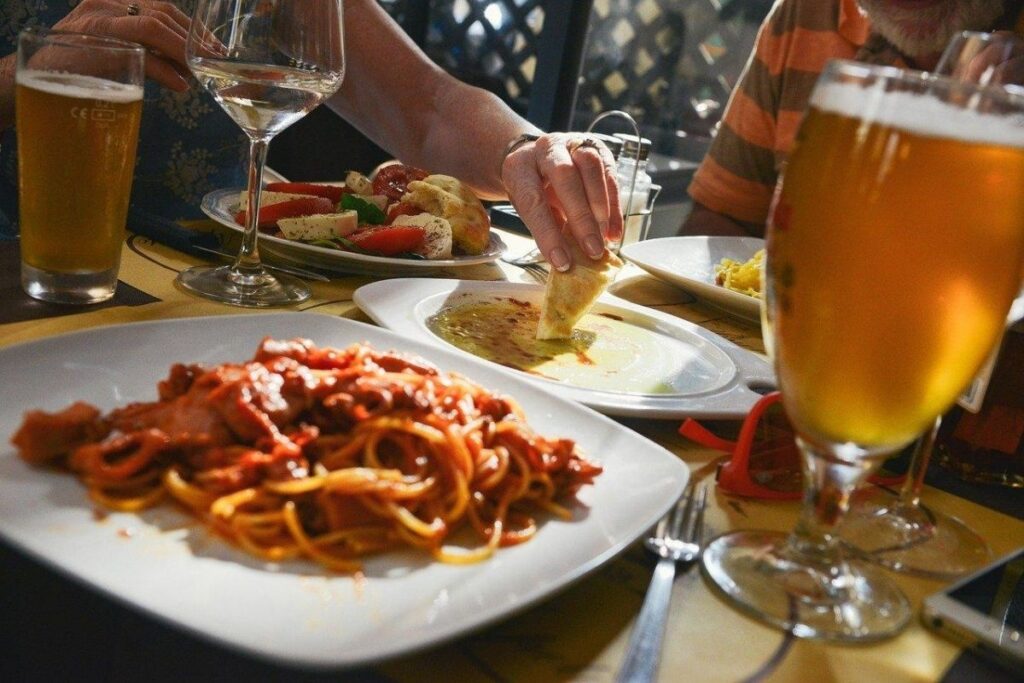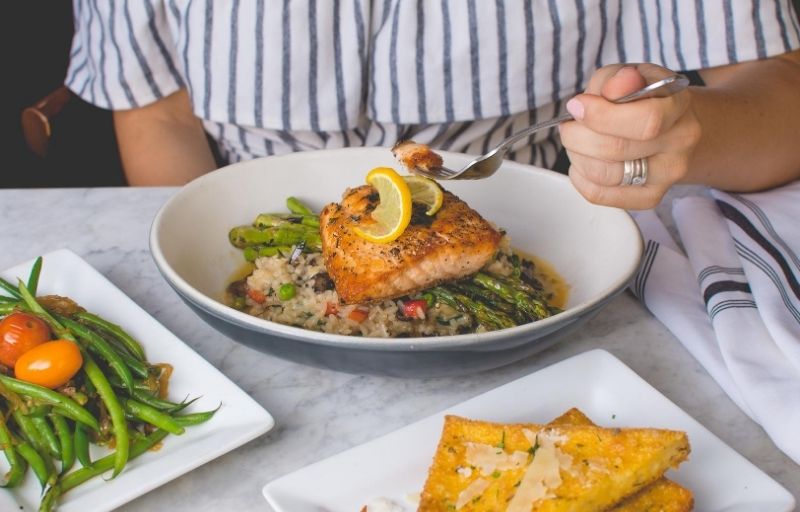Can hypnotherapy improve my relationship with food?
When it comes to problematic relationships, the advice can often centre around taking a step back or having a break, but with food, that’s not really an option. We all need to eat. Yet for those of us who have a turbulent relationship with food, simple tasks like food shopping, eating out, or even deciding on what to cook at home can feel like a minefield.

According to the statistics, we’ve seen a 24% increase in obesity-related hospital admissions in the UK over recent years. Over a third (35%) of adults in England are overweight, with a further 28% being estimated to fall into the obese category. Yet despite an endless stream of government-backed schemes to get us into weekly weight loss classes, for many of us, diets just don’t work. But why is that, and is there a more sustainable way to improve our relationship with what we eat?
Why don’t diets work?
Restricting what we eat, following rigid diet plans, or attending weekly meetings do work for some people. However, this can often be a short-term solution that leads many to experience yo-yo dieting, weight loss and weight gain. Hypnotherapist Becca Teers explains more.
“Diets don’t tend to deal with the permanent lifestyle changes required, such as a sustainable long-term change in our eating habits and attitude to food. Many diet plans are temporary and can be difficult to maintain on an ongoing basis, often because they are too restrictive or they totally deprive us of our favourite foods.”
So while we may see short-term successes, because we aren’t challenging our overall perception of food, as well as any underlying issues that may have lead to unhealthy eating behaviours (such as using food as a coping mechanism), we aren’t setting ourselves up for long-term success.
In fact, Becca explains, we could be creating a more negative cycle for ourselves. “By causing us to count calories or consciously measure potion size or even totally omit types of foods, many diets can make us more obsessed with food and our eating. This can take the pleasure out of eating, and can lead us to crave more of certain foods. A diet, overeat/binge cycle can start.”
By causing us to focus on the idea that what we eat – and any related weight worries – are merely the result of willpower, and are something we just need to ‘try harder’ to change, diets can lead us to ignore the underlying problems that are really causing us to struggle.

Why do I struggle with food?
Problematic relationships with food aren’t ‘just down to willpower’. Hectic schedules, attitudes to food whilst we were growing up, and unconscious emotions, beliefs, or behaviours that we may be unaware we have developed can all lead to unhealthy relationships with food. Whether you struggle with making healthier food choices, overeating, or have a problem with ‘fussy eating’, the chances are that there is an underlying issue that you may not even be aware of – or that you may not know how to fix. Some of the common reasons people can develop an unhealthy relationship with food can include:
Comfort eating. Also known as emotional eating, some people turn to food as a way of coping with challenging thoughts, feelings, emotions, or situations. If you find yourself reaching for a snack when you are upset or stressed, use food as a way to motivate yourself to get through a tough task or to overcome boredom, these are all signs that you might be using food as a way to boost your mood.
Stress. Spotting the signs of stress can be tough. When we feel overwhelmed and unable to cope, it can be a clear sign that we’re under too much pressure. But for some of us, our stress levels can gradually increase over time, and we may not realise they are becoming unmanageable, as we try to find ways to self-medicate to change how we are feeling.
We might notice if our drinking increases as our stress levels do – going from a glass of wine to get over a stressful day, up to three, four, or even a whole bottle – but what about what we eat? That’s not to say every little indulgence is a sign of a wider problem, but by its very nature, food – something we need to live, that we all enjoy on a daily basis – can become hard to define concerning patterns.
Food addictions. While there are still debates surrounding the term ‘food addiction’, many can agree that what and how we eat can fall under a kind of behavioural addiction. Certain foods that may cause spikes in feel-good chemicals or our energy levels can lead us to temporarily feeling great – but often do not provide us with an ongoing feeling of being full or satisfied. Over time, this can mean that we need to eat more and more of something, to get that same feeling. This can lead to further problems of feelings of guilt, shame, and can even negatively impact your self-esteem and self-confidence.
Past life experiences. Other underlying factors from our pasts can impact our ongoing attitudes to and behaviours around food. Past trauma, abuse, learned behaviours from our families, difficulty coping with negative emotions, grief, loss, or low self-esteem can all contribute.
It’s become a habit. Over time, bad habits can develop without us realising. Perhaps you find yourself eating when you aren’t hungry, you always buy a snack with your morning coffee, or you can’t imagine going out to the cinema without getting some popcorn. Identifying these habits on our own can be tricky.
Health (physical or mental) related conditions. Hormonal imbalances, medication side-effects, even certain mental health conditions such as depression or anxiety can all lead to unhealthy eating behaviours or trouble with food. If you are worried that another underlying condition may be causing you eating problems, it’s important to speak with your GP.
How can hypnotherapy help?
Working with a hypnotherapist can help you address a wide range of issues and challenges. A qualified, experienced therapist will be able to help you to identify and address any underlying reasons why you may be struggling with food.
Hypnotherapy can help you to learn how to process negative emotions in a more positive, healthy, sustainable way that can allow you to avoid comfort eating. For those who eat or snack without thinking, such as when you’re cooking or in between meals, if mindful eating doesn’t work for you, gastric band hypnotherapy may be able to help you feel fuller for longer. This can help you to avoid grazing on unhealthy foods.
Through working with an experienced hypnotherapist, you can learn new tools and techniques to help you manage ongoing or fluctuating stress levels, anxiety, or emotional overload. With their help and guidance, you can better understand how these may be affecting different areas of your life as a whole, helping you to make positive changes that can have a wider, ongoing impact.

As Julia shares through her personal experience of trying hypnotherapy for emotional eating, hypnosis can also help you to learn how to better communicate with and understand your body.
“It had got to the point where I’d become obsessed [with food] and it wasn’t great for me. I’ve become a lot less bothered about eating. I still enjoy it but I’ve learned to eat when my body is hungry and not just because my mind wants something to soothe my emotions. Hypnotherapy has really helped me to get a handle on things.
“I have started to learn more about our internal patterns, where they come from and how we go about changing them.”
Does hypnotherapy work?
A common question when it comes to hypnosis is: will it work for me? It’s hard to know until you try it yourself. Studies have shown hypnotherapy can be an effective option for easing anxiety, treating certain addictions, and even tackling overeating.
As with all forms of hypnotherapy, it requires an open mind, a desire for change, and dedication. Some people may see changes in behaviour after just one session, whilst others may need several to see real improvements. Your hypnotherapist may suggest self-hypnosis techniques you can try yourself between sessions to help reinforce new ideas and to encourage continued progress.

Find a hypnotherapist dealing with Eating problems
All therapists are verified professionals





